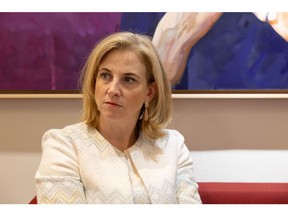
Article content
(Bloomberg) — Austria hopes to become a stronger force in global diplomacy and a hub for conflict resolution. Key to those efforts, according to Foreign Minister Beate Meinl-Reisinger, is sticking to decades-old military neutrality despite a raging war in the nation’s proximity.
THIS CONTENT IS RESERVED FOR SUBSCRIBERS ONLY
Subscribe now to read the latest news in your city and across Canada.
- Exclusive articles from Barbara Shecter, Joe O'Connor, Gabriel Friedman, and others.
- Daily content from Financial Times, the world's leading global business publication.
- Unlimited online access to read articles from Financial Post, National Post and 15 news sites across Canada with one account.
- National Post ePaper, an electronic replica of the print edition to view on any device, share and comment on.
- Daily puzzles, including the New York Times Crossword.
SUBSCRIBE TO UNLOCK MORE ARTICLES
Subscribe now to read the latest news in your city and across Canada.
- Exclusive articles from Barbara Shecter, Joe O'Connor, Gabriel Friedman and others.
- Daily content from Financial Times, the world's leading global business publication.
- Unlimited online access to read articles from Financial Post, National Post and 15 news sites across Canada with one account.
- National Post ePaper, an electronic replica of the print edition to view on any device, share and comment on.
- Daily puzzles, including the New York Times Crossword.
REGISTER / SIGN IN TO UNLOCK MORE ARTICLES
Create an account or sign in to continue with your reading experience.
- Access articles from across Canada with one account.
- Share your thoughts and join the conversation in the comments.
- Enjoy additional articles per month.
- Get email updates from your favourite authors.
THIS ARTICLE IS FREE TO READ REGISTER TO UNLOCK.
Create an account or sign in to continue with your reading experience.
- Access articles from across Canada with one account
- Share your thoughts and join the conversation in the comments
- Enjoy additional articles per month
- Get email updates from your favourite authors
Sign In or Create an Account
or
Article content
The nation’s top diplomat is campaigning for a seat on the United Nations Security Council, offering to host eventual peace talks between Russia and Ukraine, and pushing for a return to the negotiating table on Iran’s nuclear program.
Article content
Article content
Article content
Her energetic drive since taking office in March as part of a three-way coalition government seeks to help Austria find its place in the new world order. Once a gateway between Europe’s east and west, Vienna’s economic and political relevance has faded due to its longest recession since World War II, and as former Communist neighbors forge their own paths in international politics.
Article content
By signing up you consent to receive the above newsletter from Postmedia Network Inc.
Article content
Being outside the North Atlantic Treaty Organization, like neighboring Switzerland, may play out to Austria’s benefit.
Article content
“There is an advantage to not being a member of NATO,” Meinl-Reisinger, 47, said in an interview. “This is a certain understanding that you always have to stick to dialogue.”
Article content
Her pitch is based on the long history of Viennese diplomacy. The Habsburg Empire grew into a European power through strategic marriages, as opposed to waging wars. In a recent speech, Meinl-Reisinger referred to the weight of her office set by the legacy of prominent diplomats such as Klemens von Metternich, the architect of order in post-Napoleonic Europe.
Article content
Austria hosts major international organizations, including the Organization for Security and Co-operation in Europe and the International Atomic Energy Agency.
Article content
Article content
Its military non-alignment is a result of the 1955 state contract that granted independence from a decade of allied occupation following World War II. That remains among the most popular policies in Austria and hasn’t been seriously questioned, even after Russia’s full-scale invasion of Ukraine in 2022, which spurred Finland and Sweden to join NATO.
Article content
Yet Austria’s approach raises questions.
Article content
Areas of western Ukraine that have faced Russian missile and drone strikes are closer to Vienna than Bregenz, the capital of Austria’s Vorarlberg province near the Swiss border. The country de facto relies on NATO’s security guarantees to neighboring Slovakia and Hungary to buffer itself from Russian aggression. And it spends about 1% of gross domestic product on defense annually, a fifth of Poland’s relative outlay.
Article content
“We are not a NATO member, and I’m not in favor of joining NATO,” Meinl-Reisinger said. “What we should talk about is adapting our security strategy to new realities, and not to misuse the term neutrality as a cover up, or for clearly pro-Russian interests.”

.jpg) 2 hours ago
3
2 hours ago
3
 English (US)
English (US)